Superhero Villains and their Struggle with Morality
In a superhero movie, the hero is considered moral while the villain takes on the role of immoral. Let’s first define what is moral in this particular context. A proper definition would be “principles concerning the distinction between right and wrong or good and bad behavior.” Being moral here stands for protecting the people under your authority, whether they like your vigilance or not. Essentially, the superheroes have to distinguish between the right and the wrong. We’re talking about fictional characters here so we can freely look at things from a moviegoer’s perspective and not an absolutist perspective. So what is morality? Well, whatever is right from the point of view of the audience. If a villain is setting up an explosive charge under a bridge at peak traffic to mass murder — it’s immoral. A superhero discharging the explosive and saving everybody is the right thing — it’s moral. If we just stress from the moviegoer’s perspective then we can clearly define what sort of emotion we’re discussing here when echoing the word morality.
In contrast, a fully developed superhero villain has internal struggles; they constantly battle with right or just behaviors. The pathos of the superhero villain is not considered virtuous; their behavior is questionable to say the least. Let’s explore some familiar villains and their struggles with morals and then take a look at villains who possess the tendencies of a sociopath and psychopath.
- Avengers: Age of Ultron: The Avengers destroyed the base of Hydra but the Hydra leaders still have a never-ending motivation for accomplishing their aims. They’re just like, “We’ll just make another one. What’s the big deal, lol”.
- Batman v Superman: Batman and Superman triumph over Lex Luthor multiple times, yet it feels like he has no obstacles for his goals.
- The Dark Knight: The Joker is perhaps the biggest example of this phenomenon. He’s motivated to the point of insanity. He has a blind faith in his objective.
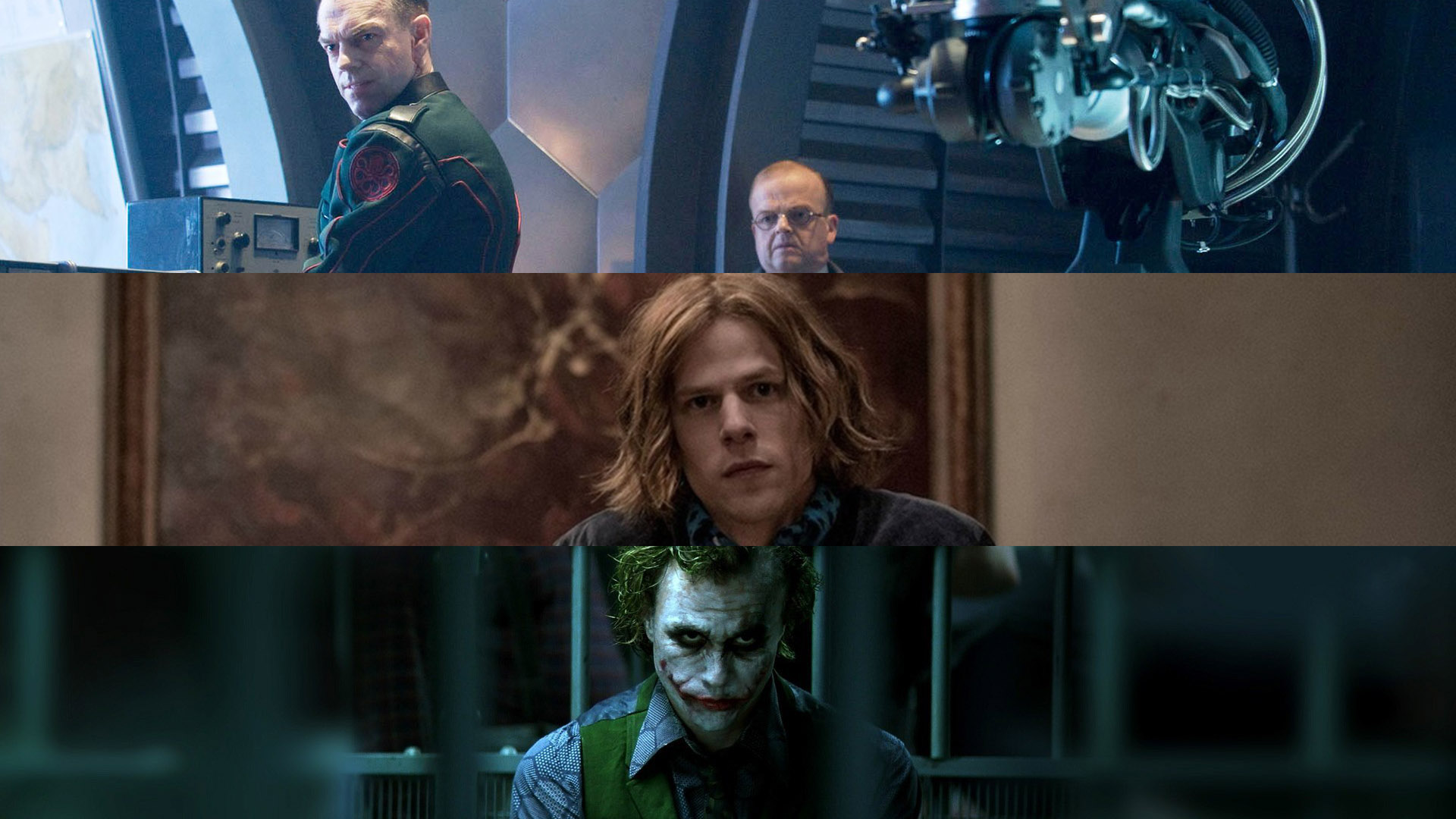
For valid reasons (but sometimes not so valid), they have an unending desire to accomplish their evil deeds. The opposite isn’t true however. The superheroes often experience setback and it causes them to become temporarily unstable both emotionally and physically.
This pattern of the superheroes experiencing setbacks, their questioning the beliefs, and their desire to make sure that what they’re doing can be justified is what makes them heroic. This piece is about villains, so we won’t be covering superhero examples about how they show morality. Because all superheroes do that and if we discuss that too, it’ll quickly bloat the article.
So what are the reasons behind the villains not struggling with morality? Let’s figure that out first.
Sociopathic and Psychopathic Tendencies
One reason for this behavior of superhero movie villains is that sometimes they have sociopathic or psychopathic tendencies. These tendencies block any chance of telling what’s moral apart from what’s not. Their sense of emotionally judging morality is lost.
But there seems to have a little problem.
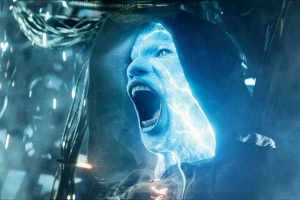
Sociopathic or psychopathic behavior would, as a side-effect, trigger a lot of violence and disorderly actions leading to extreme antisocial actions, desperate acts of violence, abnormally destructive behavior, etc. And this happens, say in the case of Batman’s enemy Joker or Spiderman’s enemy Electro, both of whom try to create extreme violence. And here’s the problem: Amid all this, a person cannot possibly concentrate on a single motive wholeheartedly. But the villains manage to do that, which seems quite strange.
Here’s what I mean: Suppose you’re under the influence of a highly destructive power and an extreme psychopathic behavior. Would you have enough consciousness to have a domination aim, make intellectual strategies, stay one step ahead of a superhero with equally destructive powers, and yet remain cool even when facing the FBI or military, let alone a loved and respected superhero?
Yes, if you have too much power you might think that no one can stop you from wreaking havoc. But I don’t think that in a situation like that you would be able to make strategies, hold up to your intellectual ideology, and yet have a complicated road-map of how to accomplish your domination and/or victory aims.
Insanity is another arguable reasoning. But the same opinion applies here too — an insane person would experience substantial instability and thus would lack the concentration required to be a villain with a set of big evil plans.
Now, we’re strictly discussing morality and not the origin of the motives behind the violent nature of villains. The origin of the motives are always well-defined and acceptable to a certain degree. Like Electro became evil because of distrust and lack of recognition, or Sandman in Spider-Man 3 also had a very strong case for his motives.
Director’s Perspective: Bonding the Audience with the Hero
Not everything is decided by the characters. While telling a story, a director or a writer has to make sure there are certain elements that work together for it to play out coherently. The superheroes need to have struggles. They need to have real life problems. They need to experience hard times where they question their beliefs and the beliefs of those they love.
All this works together systematically to give the audience a feel that the superheroes are also humans. They can be loved; they stand for something. The superhero is essentially meant to be someone the general moviegoers can connect with, show empathy towards, and feel for.
Let’s take an analogy. If superheroes would’ve been like proud, near-perfect, all-powerful Greek gods — they would lose the human touch. And that’s the reason there’s no Greek mythology movie led by Zeus, but there are many led by demigods like Perseus and Hercules because they naturally inherit a portion of the “human touch.” So even if Superman is godlike, he still needs to have a significant human portion.
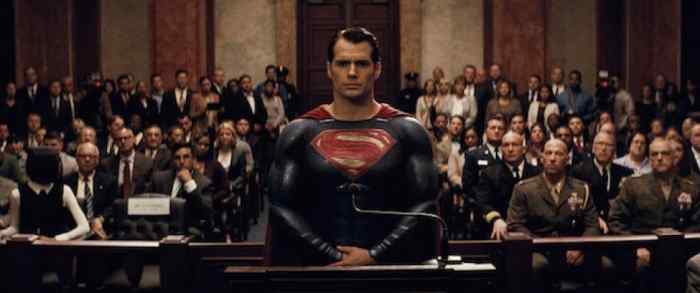
This human touch defines heroes. The heroes always struggle. Superman in Batman v Superman even reached a state where he thought his powers and authority were of no use and he should abandon his heroic efforts. The theme of Civil War is similar, it questions what’s moral and what’s not, too, just like how Superman wondered. Peter Parker also became confused at a point where he abandoned his superhero persona to normalize his life. But in the end, they all come to realize what’s really moral and what’s right. Their struggle bears fruits. And they become ideologically better than they ever were before.
In contrast, the role of a villain is fairly limited to being an obstacle for the hero, or to give a platform to the hero for proving the triumph of the correct ideology. The villains more or less look for self-interest and they naturally don’t get set back by their disbelief or hindrances.
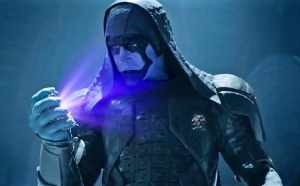
The villain is the opposite of a superhero. He’s not meant to be bonded with the audience. They’re inhuman to the point of hating everyone else and that’s what makes them so evil. However, this is only true for mainstream villains like Ultron or Ronan the Accuser from Guardians of the Galaxy. For example, Ultron has a sane reasoning. Hell, life does need a giant refresh button every eon or so. But he was scripted in a different way. How do I put it: It’s like he was disposable, an expendable unit.
Anyway. I’m saying that there are non-mainstream villains too. They are meant to be bonded with the audience. Not for too long, and probably in a way where you actually just pity them, but there are such villains. For example I actually liked General Zod’s ideology over Jor-El’s in Man of Steel.
Sinned Villains
There are some villains who are simply ensnared by one of the seven deadly sins: Greed, lust, wrath, etc. Superhero movie villains under this condition cannot be perceived to have a solid reason behind their unending motivation. When they’re affected by a sin that drives them towards an evil goal — it’s really hard to think that they have any level of sanity left.
Such villains are not rational and don’t think clearly. They’re complete opposites of intellectual villains like Joker or General Zod. It’s not impossible to imagine rational villains admitting their defeat or changing their ideology, or even developing a certain kind of invisible respect for the superhero. However, sinned villains are irrational and thus cannot be argued in favor of.
So basically these villains are motivated for the sake of motivation. It’s their sin that drives them, and not a (flawed) intellectual theory. Some examples would be Galactus, Doomsday, Red Skull, Venom, etc.
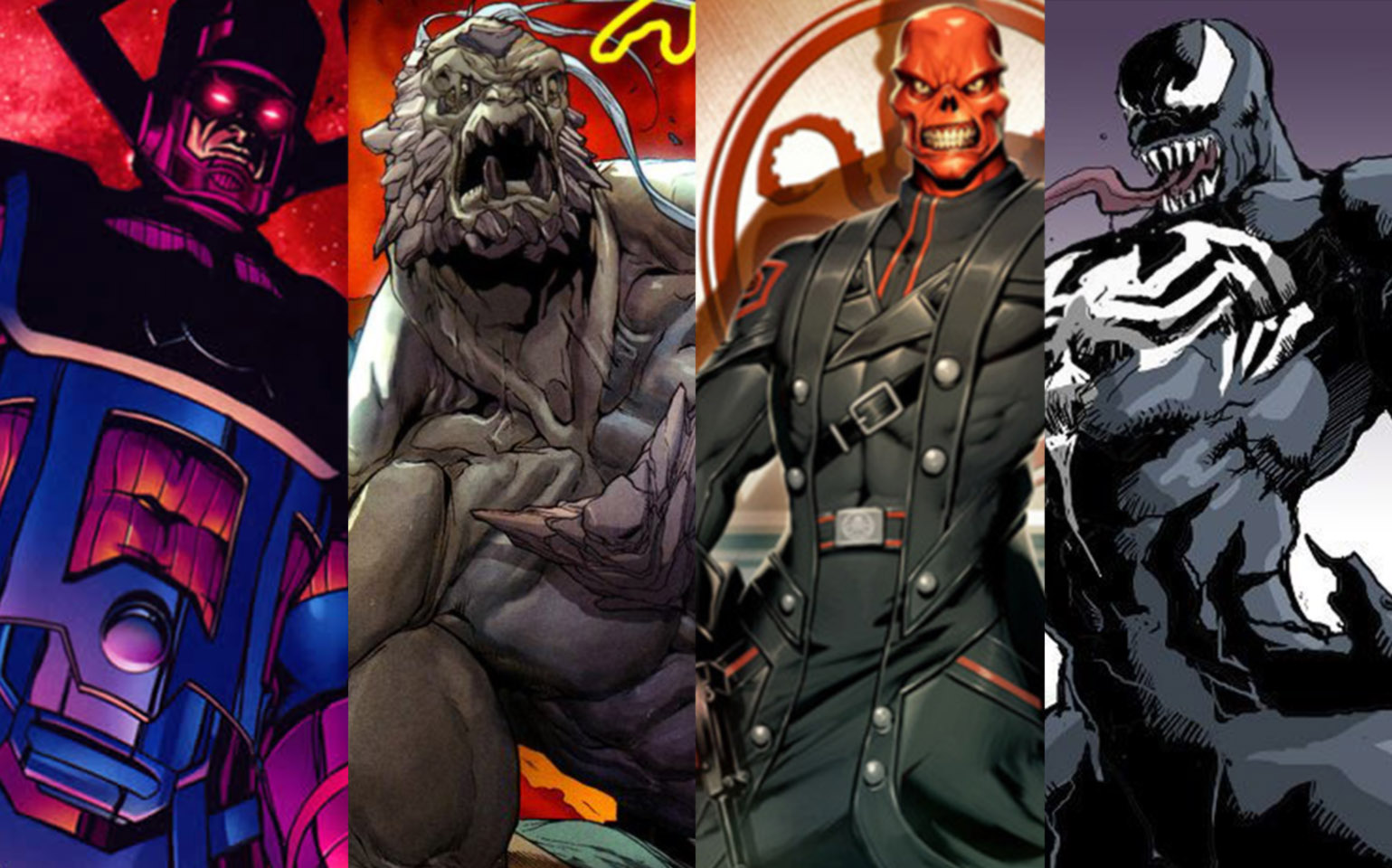
Choosing the Wrong Path
Sometimes both superheroes and villains become good and bad simply because of the circumstances. If a character experiences a harsh childhood (Green Goblin or Joker) or a troubled relationship with someone they actually worshiped who later fails them (Electro or Syndrome from The Incredibles) — they can
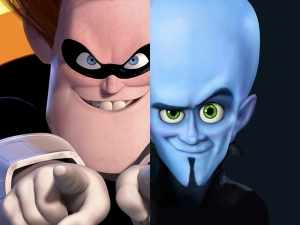
become negative and that would mean they no longer struggle with morality. They can become delusional to the point of causing destruction. They think everything their pride stood for is nothing and that’s why they must resort to evil to prove how meaningless the thoughts of justice and good deeds are. Or, they make their own skewed version of morality.
Some other villains start off on equal footing with a superhero. The circumstances both experience change them. The villain material questions the path of righteousness while the hero material likes it. And finally they make the choice of becoming who they were meant to be — a villain or a superhero: The former having abandoned the idea of morality, while the latter always employing it as one of their values, and becoming its emblem.
The circumstances of growing up and some accidental event misleading them to have their faith lifted from the system is another reason. The best example would be Megamind, who literally started off on the same footing as Metroman. One space-pod clash made all the difference.
Finally, there are some villains who do have morality in them. We’ve come across many villains who love nature, animals, and even care for humans. Harvey Dent, Electro, Loki — all of them have some sort of morality in them. You might wonder that which villain ideation is right: Moral or immoral? Well, there’s no “right” way to craft a villain. Moral, semi-moral, and immoral — all of them make for interesting villains. It’s just that this change feels good. A villain who actually has a strong reasoning, a villain who is otherwise highly moral, a villain who wreaks havoc mindlessly, and so on. We need all of them.
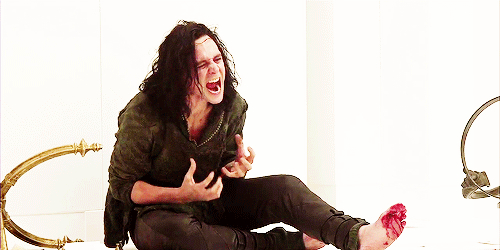
The filmmakers make sure that the villains who become evil due to circumstances and the corruption or inefficiency of the system are a chance fluctuation. Their ideology that the system is wrong derives its essence from some reality. But it’s made sure that in the end, the conception of the system being evil or inefficient is a false assumption. It’s shown that merely the circumstances were misleading. It is also implied that the superheroes also experience harsh situations that are quite similar to those of the villains. However, they keep their faith in what is just and right and therefore overcome their weakness to fall in the dark side. Their elevated sense of righteousness makes them different.
Before wrapping this up, I would like to say that ideally a villain is meant to have a certain internal struggle or a fight with immorality. A fully developed villain should have some sort of inner struggle that should also create pathos for the villain on the part of the audience. Marvel villains are mostly completely opposite of it.
What do you think? Leave a comment.











Villains and heroes and the in-between are much more about how others perceive them, whether their victims or partners or us as readers and viewers.
It is about how villains perceive themselves
This was actually a really well put together analysis.
Thanks 🙂
About 70% of villains, are Anti-Villains, because the majority of them believe they are doing the right thing.
Abhimanyu you did a very nice job on this article!
Thank you Venus
Excellent work looking at the different types of villains. I’m definitely partial to Loki. His motives for the most part are sympathetic, yet it is very clear what he is doing is wrong. I definitely agree that having a mix of various villains with differing morals/motivations is a good way to go.
Thanks and yes, Loki was really different and in fact one of the most captivating villains.
I enjoyed your article. Great pictures and points. Please write one on villainesses too. You could use Lady Macbeth, the Borg Queen and Julie Newmar’s Catwoman. One of my favorite villainesses is the girl from Golden Monkey with long white hair that uses strands of hair to wrap around her victims throat to strangle them.
But I am sure can come up with a good list and I would love to hear the motives for villainesses.
Thanks for a fun and excellent read.
Thanks a lot, and surely I will think about writing one on them too. Just that I’ve lesser experiences with vamps and therefore I get lesser examples. I’ll try though 🙂
A good assessment of villains and question of morality. I really like the examples you have provided. I am not so sure that I agree with the conclusion that Marvel villains are the complete opposite. There are many of them that come with a certain past, which create the sense of what they are doing is immoral, but in some ways justified, such as the Green Goblin or Sandman or Magneto or Mystique. But overall great work.
Thanks. I was always skeptical about the choice of examples, glad to see there are no problems.
Yes I agree that not all Marvel villains are like that. In fact, I even mentioned multiple Marvillains (lol) on the positive side like Loki.
This make me think of Regina from ONCE UPON A TIME …. I mean, she thinks she is a villian but eventually she realizes sthat whether your a villian or a hero is up to the individual and I think that is really relavent to this in some strange relevnt way.. I think it’s not up to the reader to decide but more to the actual character themselves.. that sounds really dumb but I hope you get my point.
Yeah, I totally agree 🙂
The path of the righteous man is beset on all sides by the inequities of the selfish and the tyranny of evil men.
Villains serve as foils to keep the superheroes motivated.
We really fascinated by supervillains.
I was reminded of the absolute life-affirming necessity of simple virtue the other day when I stood, exasperated to the point of silence, before a local comic book vendor who declared her hatred (yes, she used that word) for Superman upon the basis of his being ‘too perfect and too nice.’ Admittedly, when one is attempting to defend unalloyed goodness to a reader who claims the Joker, Harley Quinn and Deadpool as her favourite characters, the adjective ‘Sisyphean’ does spring to mind.
A very relevant piece. Recently re-watched the Dark Knight Trilogy and also Kick-Ass. Needless to say, I pondered over many of the questions you raise here.
Whenever the discussions regarding heroes, antiheroes and villains arise, I am reminded of how hard it is to simply state things in black-and-white because things are actually much more than that, and behaviors can be either bad or good depending on the point of view.
Interesting points and ones I agree with.
Bad is stronger than good.
Modern superhero comics (and the films they’ve inspired) are moral tales on steroids.
This article is the reason I’m such a fan of The Artiface. The author has brought insight into our popular culture and helped us all realize why we still read comics as adults. The problem of what motivates the villain is always difficult. If the heroes are our aspirations, our super ego; then villains are our id. To go further down this path of motivation and action eventually leads to contemplation of what is good, what is evil, and what is absurd. This is an element of all great art.
Strunk and White’s ‘ The Elements of Style,’ or similar writing aids would help make these articles even more readable – if not publishable.
Thanks, that means a lot. Artifice authors really work hard on each article 🙂
You’ve given some great points and examples about the struggle villains face. A lot of people see evil and good as being black and white, failing to really see what drives the villains to do what they do.
A lot of agreements here
Even Thor and Captain America eventually kill. Even Daredevil, in the Netflix series, ends up killing.
Taking lives is not exactly a point that defines a villain.
Zoom is an example of a villain with morals. He wouldn’t kill heroes as he wants to “better” them.
Interesting study. Perhaps villains are popular because superheroes, by themselves, are boring.
Yeah, a very nice deduction…
A more in-depth look at the Loki brand of villain would be extremely interesting: the most compelling villains tend to be the ones who are only one decision, or one change to they way they operate, away from being heroes. Great work!
Yes, I agree. And thanks 😀
Flash Rogues have a ‘no kill’ code and mutual respect with the flash, they treat each other like people.
I think motivation is essential to villainy. Villains wreaking havoc for havoc’s sake aren’t nearly as interesting as villains with a well-thought-out ideology. This is why I prefer ‘Daredevil’s’ Kingpin to ‘Jessica Jones’ Kilgrave. Wilson Fisk genuinely believes he can save Hell’s Kitchen, albeit through illegal means, and his realization that he can’t save the city and his acceptance that he is “the ill intent” is fascinating. Kilgrave, on the other hand, is selfish and cruel simply because he has the power to be selfish and cruel and doesn’t change much over the course of 13 episodes.
Loki has kind of a noble birth with heroic or potentially heroic qualities, just like Macbeth, and both are fated by the Gods or supernatural forces to doom and destruction.
With the focus on comic book adaptations, it’s worth examining how the structure of serial comics affects the way villains are constructed. Comic book villains are undeterred by setbacks in part because they have to return in future installments; Lex Luthor can never be truly beaten by Superman, because the readers want him to come back next year with an even cooler plan.
Iconic heroes and villains in comic books both need to be unstoppable, or at least ridiculously persistent, because their story arcs are open-ended. The interesting thing is the way authors adjust the readers’ perception of their persistence: the hero’s story keeps going because he’s so noble and strong that he never gives up, while the villain keeps going because they’re a sociopath with no remorse or care for casualties.
Fascinating topic though I would love to see a more in depth analysis of certain characters.
I really enjoyed this article and it leaves me with a lot to think about.
Glad you liked it.
This was a very interesting read. Morals is becoming a trickier subject to talk about in today’s world as everyone is constantly forming their own opinion. I really thought you had an in depth discussion on the topic! However, there were a few points I thought you could have elaborated on. You would say something interesting and then move on. Overall though, it was a good study.
Thank you, and gotta keep the article from becoming a thesis you know 🙂
Speaking of those semi-divine Greek heroes -Perseus & Heracles are each exceptional heroes.
The story of Perseus – a son of Zeus – is a much older myth than other classical myths. Perseus maintains good relations with women (mother, wife) and gods and goddesses as well, and has a happy ending – with many fairy tale elements.
Heracles (another offspring of Zeus) was purposely created to assist Zeus in overcoming specific adversaries (Titans, Giants). Heracles is also different from most heroes in other ways. He is primarily a beastmaster rather than a warrior. And is the only hero to attain immortality, ascend to Mt. Olympus and marry into the Olympian family.
The more “normal” Greek hero is – generally speaking – seeking to attain honour and glory. Honour is visible & measurable as the acquisition of material goods. Glory – fame beyond one’s life – is the only form of immortality available to mere mortals. Deceit, brutal slaughter, pillage and rape are common “heroic” activities. These heroes are often dangerous to themselves and those around them. They openly celebrate their own prowess. And expect rewards for it.
Homeric heroes share more traits with our villains than with our heroes.
Hmm, a very interesting point. However I gave that argument from the point of view of a general moviegoer. When you dwell deep in Greek mythology and ancient Greek literature only then you can relate heroes like these with villains in our superhero culture.
Mostly, in media ranging from children cartoons to mythology movies — these demigods are meant to represent a part-human god. A god who chooses to remain human, putting aside all those rewards he would be getting.
And they are often righteous and play the hero part, rather than being the villainous one. The gods, sometimes, are shown negatively.
This is a very interesting perspective. If only real life was as simple as some of the stories found in comics and movies. Although it is clear that superhero movies have inevitably evolved into a more believable line of story telling.
What about Deadpool? I think he is a very interesting case in regards to this article.
Great material!!! Thank you for this!!
Thanks, I really appreciate it!
As for Deadpool, let’s just say that I didn’t find any place to put him in even if his relevance to this article is solid. Deadpool is a hero without the classic superhero-ishness in him. Probably that’s why he never crossed my mind because this articles talks about morals and heroes.
However, as you say, his case is very interesting relative to this article’s content. He has morals that differ from normal superheroes’. He is often destructive. So are we going to see another breed of superheroes where the line between a moral villain and an immoral superhero blur? Hancock is quite similar too.
I will admit I am not a fan of the idea of superheroes — to me they are very bland and far fetched — which is why I appreciate your take on the depth of so many classic characters.
There have been some wonderfully ponderous fan-theories about the Joker in The Dark Knight series. One of my favourites posits that the Joker is actually the protagonist of the film. When you look at what he did for Gotham (yes, through violence, mayhem and injustice), the clear immorality of the character becomes muddied. Gotham, pre-Joker, had serious problems with organized crime and corruption, and a vigilante (Batman). Gotham, post-Joker, had much less organized crime, corruption, and a missing vigilante.
I think this consideration deserves some attention as your definition of film morality as “whatever is right from the point of view of the audience” could indicate the Joker as a moral character if the film portrayed him as a deeply flawed but pragmatic savior for Gotham.
Nice deduction, you’re correct.
Wow this was a really well-put article! I especially liked the point you made about how some villains are so intellectual yet psycho/sociopathic. Do you think that this may be one of the reasons why the audience may be led to feel alienated from the villain because it is simply not humanly possible to be both intellectually focused and psycho/sociopathic?
Perhaps! 🙂
So many characteristics of so many different villains! Wonderful way of exploring and exposing the way many classic, probably most, villains are relentlessly “evil” and why particular creators portray them that way. Also, considering those villains who do struggle with morality, as you pointed out Loki does, reminds me of Magneto who does too in the X-men comics/ movies. Would you consider that maybe those villains who have those internal struggles due to their sense of reality are also those who are struggling with their identity as a character, trying to figure out where they fit in the story around them? Such as Buddy in the Incredibles who initially tries to be a hero alongside Mr. Incredible but when rejected decides that since he can’t be the real good guy, he’ll be the “fake good guy” which ultimately makes him the villain creating the conflict that the Incredibles must overcome.
Yes, sometimes they also fight with their identity. I really missed talking about Magneto, he was a good example.
Not comic book/superhero fiction but this read reminded me of how fans and his portrayer Charles Dance discuss Tywin Lannister from Game of Thrones/ASOIAF. Definitely a villain, cold-hearted, etc. but some would argue is a cold logic and rationality to his actions. To paraphrase Dance in an interview, “They’re are not my values, not your values, not the values most would agree with, but they are his and they make sense to him and the system/world he’s living in”. I think this applies very much to Zod in Man of Steel. In the context of the film, it does make perfect sense *for him* to pursue the course of action that he does.
I really enjoyed the way you went about writing this article- talking about what makes a hero a hero and what makes a villain a villain. I think it would have been important though, to add in the fact that most often, the focus of the hero-villain conflict is focused on bringing out the strengths and flaws of the heroes, but that in many cases, it brings out the same traits in the villains. I really really enjoyed how you tied their morals in too- that was fantastic! Thank you for such a great read 🙂
Thank you 🙂
Nice job covering a broad range of villains.
Thanks!
I agree that a well developed villain, is often one that we can feel pathos for. Furthermore, the writer has done a good job on the villain when the audience feels sympathy for them even when they have done terrible things.
Someone who’s missing entirely from this list is Two-Face. A lot could be done with the motivation and drive of Harvey Dent.
Wow, I wonder why he never crossed my mind. I really regret it.
Deadpool would be an interesting figure to discuss in this topic for his anti-hero antics
I loved this article; I appreciate that you did not focus solely on one kind of villain. However, unfortunately time and time again supervillains are generally introduced solely to further the plot or character develop the superhero. Villains tend to see people and actions as a means to an end due to their complete lack of empathy. Whereas heroes pursue the most good for the most people, villains use any means necessary to be heard and shape the world into the reality they see which is typically a negative perspective. Because heroes need villains, like anything has to have an opposite, there should be better character development with villains verses using them as plot devices. The readers can identify with heroes because they offer hope. For example, iron man could have identified he had failed and gone mad in captivity, but he rejected having that as his legacy. On the other hand, the Joker tried to prove one bad day could drive anyone mad in “The Killing Joke” to justify who he was. Villains accept failure and try to take everyone down with them versus heroes that always offer hope which admittedly creates a more dynamic character. Is Marvel or DC writing actually poor when it comes to villains, or is the complexity of the villain dependent on that element of a villain’s nature?
You raise a valid point. As comparison to superheroes, the villains experience negligible development because of their counterpart.
There seems to be a pattern emerging in cinema where the lines between moral and immoral are becoming more blurred, especially in Batman vs. Superman and Captain America: Civil War. This is possibly reflective of the growth in Postmodernism, where people are becoming more intrigued by pushing the boundaries established during the prevalence of Modernism. It will be interesting to see where this progression leads us!
As an educator of society, comics shine a light on behavior characteristics and then amplify them using literally thin edges to separate scenes in action!!
There is a huge metaphor on the classes of a society, and money is used as an identifier for many classic scenarios. The villain’s need the money so something about a bank, or a villain is someone that too much money or is too smart like Doom who owns a country.
These are individuals who fall outside normal. At the same, they do choose to be a villain and revel in it. They forgo or bastardize things like honor, or have some twisted perspective on the concepts… Bizzarro, like creating the problem so they can be the hero!!
I have found an interesting trend and increase in the anti-hero as the villain. They are hero-like, but don’t want to be called a hero, so they can still be bad as they want to be, or they play a role in society that is undefined in text books or is too complex to understand by normal people. They actually might be a villain to keep other types of villainy in check.
A really great example of this is Mafia, as depicted by Mafia Boss Falcone in the recent Gotham t.v. series.
Well put! My favorite kind of villain happens to be the “hero-villain” since they believe their sentence morality to be justifiable because of good “morals.
I think you misunderstand the Joker. He’s insane because he has no morality at all. He really doesn’t care. Saving people’s lives, killing them, it doesn’t matter as long as it riles up Batman.
And while we’re on the topic of supervillains from comic books, I think you’re right that Marvel isn’t known for having good villains outside of Loki. Civil War did a good job making a very human bad-guy. And Ultron wasn’t a bland villain, he just didn’t get enough screen time. Overall, the less interesting villains are probably a result of just having too much packed into one movie.
Probably, yes 🙂
Wonderful article that masterfully captures the many motives and facets of villainy.
The case you make on villains is valid and I agree with the majority of what you have stated. Superheros are the ego of what is good and the alter ego to that would be anything bad. The derivative of good is found in the case of, let’s say Batman. His vendetta toward Gotham of his parents death keeps his morals in check. He takes the face of his fears to fight all that is the evil in Gotham. His enemies are evil in the sense that they attest to Batman’s vendetta. . . simply put.
However, Batman is also considered a anti-hero because of his gloomy past and what the new movies have set him out to be etc. To take a fall for what is right, Batman must take the face of what is wrong.
Now, another anti-hero that I identify with is Spawn. He was not mentioned in this article for which is why I am commenting. Spawn’s dilemma is that he was originally was a bad dude. A CIA killing machine that when at the face of death, he made a deal with the devil to live again only to see his wife again. I am questioning what makes a man evil opposed to being good. Because Spawn, he is caught right in between. After selling his soul to the devil, he is confronted with a moral dilemma. no matter what he does, killing bad guys for the right reasons, their souls are sent straight to Malebolgia’s army, strengthening its numbers for Armageddon. Spawn made a deal with the devil based on a selfish sentiment. He takes actions to correct it by protecting children etc, but at a catch 22.
My point that I am trying to make is, villains sometimes have an inner conflict that isn’t reflected properly. It’s like the argument of free-will vs. fate. Sometimes the human condition is damned to the point where evil is defined just by selfish acts.
I would love to hear anyone’s response to this. Thanks!
Wow, Spawn’s case is really interesting. Regrettably I don’t know him, my lack of exposure nothing else. Yes, it’s really hard to differentiate right from wrong in such a case and the fiber of morality becomes really thin here…
Hahaha, yeah. Spawn will blow your mind. He’s a character created by Todd Mcfarlane. Perhaps the most dismal depressing anti-hero. Still a badass though. Thanks for your response by the way. I really loved your article. It gave a different perspective and background on villains. Keep up the writing!
I actually love villains more than the heroes sometimes; I think that in a lot of cases, while it is despicable what some of them do, that a lot of them are just very human with questionable morals. Even Wilson Fisk in Daredevil was doing what he did to try to clean up Hell’s Kitchen after everything that was happening there and after the Battle of New York in the Avengers.
With the Joker, especially in The Dark Knight, this was a guy that (assuming that fan theories about him being a soldier with PTSD are correct) was extremely disillusioned with the way that society was and thought the only way to fix everything that happened to him and get retribution for it was to have a war on Gotham itself.
I think a lot of what make a hero a hero is just a matter of circumstance and opinion. On the one hand, we have radical good (like most of the beloved superheroes), but on the other hand, we have this sort of chaotic neutral that believes what they are doing is good but might be misguided.
Its a very interesting topic, anyway.
I feel like shows like Gotham, which highlight origin stories of villains show this link between sanity and this struggle with morality very well. With villains it’s always interesting to see what may have led them to the path of villainy, if it was their inability to cope with an injustice they have suffered that lead to their insanity, or if it was their mental health that lead to their path. Great article!
Although I don’t agree with some of your assertions, such as that socio/ psychopathy inherently lead to violent actions, I see that you have given some thought to what your writing since you define some of your terms. I would recommend outlining your argument from your thesis, since your thesis had a tendency to get lost in other tertiary points your gave in the second half of your paper. Also, be mindful of spelling/ grammatical errors.
While I usually loathe superhero movies, they do tend to have interesting ethical and philosophical undertones to the nature of the hero and his/her circumstances.
It’s always been a belief of mine that a hero can only be as strong as their villain. If the villain is all power and no humanity, that is a boring villain. If we can’t sympathize with the villain, we can’t understand their motives. Their goals become unimportant because we know that the hero will win.
One of my favorite villains who struggles with morality, besides Loki, is Kylo-Ren. I love how The Force Awakens shows his internal struggle, which is interesting because he wants to be evil and sees his good side as a weakness. I like when he talks to Darth Vader’s helmet and asks forgiveness because “I feel it again… The pull to the light.”
The most recent Spiderman movie (Spiderman: No Way Home) does illuminate moral struggles well.
As something of an egoist or nihilist myself I see this as more a struggle of emotions and ideologies, as well as different people having similar principles but not agreeing on their application. There really is no object or state of ‘morality’, and even the most altruistic nice guy is just don’t it because he wants to. That’s how subjectivity works, and all moral conflicts, wars, etc are just conflicting self interest, self defined I might add. It’s impossible to have any agency and not be an egoist, physically and logically. But what is good or what principles matter is subjective, not that there’s no pattern or logic to them but they’re entirely dependent on your personal motives and ideas.